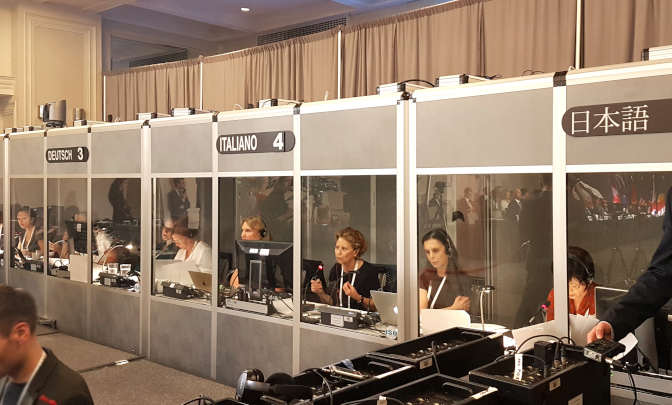The Covid-19 pandemic accelerated the implementation of Work From Home (WFH) and Remote Simultaneous Interpretation (RSI) practices to a degree nobody could have imagined before. Today, many conference / simultaneous interpreters are unhappy with the impact that WFH has brought on the interpreting industry.
We all remember it very well. When an unknown virus started spreading around the word in the first trimester of 2020, everything changed in our lives: lockdowns were enforced and most people had to stay home. All of the sudden, Work From Home became the norm for a large number of professions – including interpreters.
What started as a temporary necessity still remains a reality more than a year after ‘normality’ was finally restored in many parts of the world; now many conference interpreters are revolting against the ‘normalisation’ of remote interpretation as they fear for the future of the profession.
So this begs the question: is RSI (Remote Simultaneous Interpreting) really endangering our industry? What’s the future for conference interpreters?
What Is Remote Simultaneous Interpreting?
Remote Simultaneous Interpreting, or RSI, is a form of interpreting that is performed by the interpreter from home or from an office, using a dedicated software such as Zoom, Interprefy, Webex, Interactio, etc.
Traditionally, conference interpreters work in pairs onsite inside a soundproof booth with professional AV equipment (see example below.)

But as we know, that became impossible once the 2020 pandemic became our reality, so the only way to organise conferences and meetings was through an online setting. Naturally, interpreters followed suit, as it became the only way for us to work and make a living.
Continue Reading: The Different Types of Interpreting Explained
Why Is RSI Being So Criticised?
RSI was already a thing before the pandemic, but it had never been done to this degree (the vast majority of events were still onsite.) Then, all of the sudden, everyone in the industry was forced to work remotely.
The first issue that soon became obvious was that working from home is very different from the ‘real thing’.
When an interpreter is at the venue, usually they work inside a soundproof booth and use professional equipment (microphone, heaset, console, etc.) What’s more important, conferences are set up by a professional AV team.
Interpreters have access to good sound quality, and equally, the delegates who are listening to the interpreters can hear them well and safely through a receiver and an earpiece (at least this is what happens under normal circumstances.) Any technical problems are sorted out by the sound engineers who, again, are the ones with the technical knowledge to do so.
But when you move an interpreting event to a virtual setting, most of those elements are lost.
- Interpreters had to start learning how to use pieces of software they weren’t accustomed to in order to carry out their work, as well as invest in new interpreting equipment to allow them to perform their tasks to an acceptable level from home.
- All sorts of technical problems that inevitably occur at some point have to be sorted by the interpreters themselves, even though we aren’t necessarily IT specialists.
- The sound quality we have to work with is often terrible. Online meetings and conferences are often attended by speakers and participants who simply don’t have professional-grade equipment, a decent internet connection nor the necessary technical knowledge to improve their sound quality (again, most people aren’t IT specialists/AV technicians nor have the funds to acquire expensive equipment to use at home.)
- Communication between booth partners is much harder due to the remote nature of RSI, often requiring the use of some sort of separate piece of software (WhatsApp, Skype, etc.) to coordinate the handovers. It’s yet another layer of complexity to a job that’s already hard enough…
All the above causes the job to be more stressful, tiring and harmful to the interpreters’ health (additional cognitive overload, auditive health, etc.)
So when Covid restrictions were lifted, many interpreters were expecting the market to go back to what it used to be… except it didn’t. Onsite conferences and meetings are slowly making a comeback, but a great chunk of the market remains dominated by RSI.
That includes the European Parliament, which is still limiting onsite work. This caused a wave of discontent amongst EU interpreters, who decided to strike in June of 2022 to protest against RSI practices.
The Good Side of Remote Interpretation
More stress, more cognitive overload, auditive health hazards… one could think that every interpreter hates Remote Interpretation, but that’s not the case.
Many interpreters are quite happy with the dissemination of RSI because it has brought so many opportunities they wouldn’t have access to otherwise. Some examples include:
- It doesn’t matter where the interpreter lives. You don’t need to live in a specific city or travel long distances in order to have access to work, as everything is done online.
- Because travelling isn’t essential, you can spend more time with your family and/or enjoying your hobbies. Many colleague believe RSI has made their lives simpler and more enjoyable.
- The software companies are continually improving their tools and interpreters are learning how to become more efficient at sorting out their technical problems. There’s also an increasing number of AV technicians and event coordinators specialising in online events. It’s a learning curve, but some progress has been made since 2020.
- There’s more work available, not less. Clients can organise meetings and conferences more often because virtual events are much cheaper to organise, as they no longer need to book a venue, hire an expensive AV team, pay for flights and accommodation for the speakers and interpreters, etc.
Remote events will never be able to replicate the technical conditions onsite events provide interpreters with, but not everything is bad.
Is Remote Interpreting Here To Stay?
I’ve published a video on the topic where I explain my views in detail, but to cut a long story short… yes, I think Remote Interpretation is here to stay.
This is not to say that onsite events won’t make a comeback to a degree, but I don’t see how RSI will ever be fully gone: there is no turning back after the developments of the past couple of years. It’s sufficiently established to be regarded as a valid option, and I can’t see the private market going back to the old days in full force given how much more expensive it is.
Of course this is nothing but a prediction, so I may be wrong… the future will tell!
If you’ve found this post helpful or think it could be useful to a friend who perhaps is – or is planning to become – a translator or interpreter, please kindly consider buying me a coffee by using the button below:
I put all my heart and soul into the content I produce in order to help my fellow linguists set foot in the industry. Most of what I do is available to everyone for free.
Donating is 100% optional, but greatly appreciated. A short espresso will do! ☕















 Interpreting Training Exercise | Sports (Football)
Interpreting Training Exercise | Sports (Football)